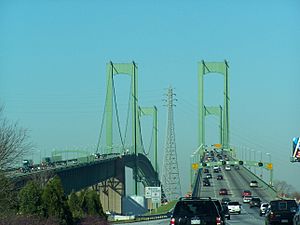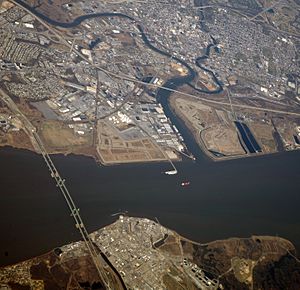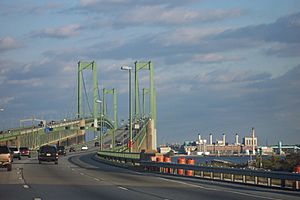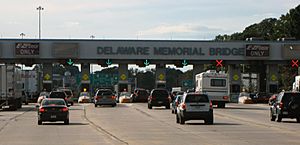Delaware Memorial Bridge facts for kids
Quick facts for kids Delaware Memorial Bridge |
|
|---|---|
 |
|
| Coordinates | 39°41′21″N 75°31′08″W / 39.68927°N 75.51897°W |
| Carries | 8 lanes of |
| Crosses | Delaware River |
| Locale | New Castle, Delaware and Pennsville Township, New Jersey |
| Maintained by | Delaware River and Bay Authority |
| ID number | 1737 |
| Website | http://www.drba.net/DelawareMemorialBridge.aspx |
| Characteristics | |
| Design | steel suspension bridge |
| Total length | 10,765 feet (3,281 m) (eastbound) 10,796 feet (3,291 m) (westbound) |
| Width | 59.1 feet (18 m) (eastbound) 58.7 feet (18 m) (westbound) |
| Longest span | 2,150 feet (655 m) |
| Clearance above | 17.9 feet (5 m) |
| Clearance below | 174 feet (53 m) |
| History | |
| Opened | August 15, 1951 (now eastbound) September 12, 1968 (westbound) |
| Statistics | |
| Daily traffic | 80,000 |
| Toll | Cars $5.00 cash, $4.75 E-ZPass, tractor-trailers $28.00 (westbound) |

The Delaware Memorial Bridge is actually two suspension bridges that cross the Delaware River. These twin bridges connect Delaware and New Jersey. They carry important highways like Interstate 295 and U.S. Route 40.
The bridge was designed by a company called HNTB, with help from a famous engineer named Othmar Ammann. He also designed other well-known bridges, like the Walt Whitman Bridge. The Delaware Memorial Bridge is special because it's one of only two crossings over the Delaware River that carries both a U.S. Highway and an Interstate Highway.
These bridges are super important for people traveling long distances. They connect parts of Interstate 95, linking the Delaware Turnpike with the New Jersey Turnpike. They also connect other major roads in New Castle, Delaware and Pennsville Township, New Jersey.
The bridges are a special memorial to honor soldiers from New Jersey and Delaware. These brave men and women died in World War II, the Korean War, the Vietnam War, and the Persian Gulf War. You can see a War Memorial on the Delaware side of the bridge. The Delaware River and Bay Authority manages the bridge and collects tolls.
The Delaware Memorial Bridge is the southernmost bridge that crosses the Delaware River for cars. It's also the only car bridge directly connecting Delaware and New Jersey. If you want another way to cross, the Cape May–Lewes Ferry can take you between New Jersey and southern Delaware.
Contents
History of the Bridge
Building the First Span
After the Benjamin Franklin Bridge opened in Philadelphia, people in Delaware and New Jersey wanted a bridge closer to Wilmington, Delaware. A ferry service started in 1926 to help with travel while they planned the bridge. Some groups worried the bridge would block ships or be a target in a war.
But as more cars and trucks used the roads, everyone saw how much a bridge was needed. In 1945, Delaware and New Jersey decided to build it. They first thought about a tunnel, but a four-lane bridge cost about the same. So, they chose the bridge! Construction began on February 1, 1949.
The first bridge cost $44 million and took two years to build. It was 175 feet (53 meters) high, with towers reaching 440 feet (134 meters) above the water. It opened on August 16, 1951. At that time, it was the sixth-longest main suspension bridge span in the world! The governors of Delaware and New Jersey dedicated it to those who died in World War II.
The bridge quickly became very popular. By 1955, almost eight million vehicles crossed it each year. This was twice as many as they expected! Even more cars used it when it connected to the new Delaware Turnpike in 1963.
Adding the Second Span
Because so many cars were using the bridge, they decided to build a second one. Construction started in 1964, about 250 feet (76 meters) north of the first bridge. This second span cost $77 million. It opened on September 12, 1968. This new bridge was dedicated to soldiers from Delaware and New Jersey who died in the Korean War and Vietnam War.
After the second span opened, the first bridge closed for about 15 months. Workers updated it, replacing parts and changing its deck. On December 29, 1969, all eight lanes of both bridges opened. This made it the world's second-longest twin suspension bridge!
The two bridges look similar, but they have some differences. The first bridge was built with riveted steel plates. The second bridge used mostly welded steel plates.
Today, the older bridge carries northbound traffic for Interstate 295. The newer bridge carries southbound traffic. There are special lanes that let traffic switch bridges if one needs to close for repairs.
The Bridge Today
In 1969, an oil tanker hit the protection system of the bridge. Luckily, the bridge itself was not damaged.
From 2003 to 2008, the bridge had a big upgrade. They resurfaced the road, fixed parts that expand and contract, and improved the electrical system. This work cost $13 million.
As of 2018, more than 80,000 vehicles cross the bridges every day!
On clear days, you can see the skyline of Philadelphia from the bridge. You can also see Wilmington, Delaware, which is very close. From tall buildings in Philadelphia, you can even see the Delaware Memorial Bridge! Other cool sights from the bridge include a nuclear power plant, oil refineries, and other bridges nearby.
The busiest day for the bridge was November 29, 2009. On that day, 79,488 vehicles crossed in one direction. The busiest weekend was August 16–18, 2019, with 211,685 vehicles crossing in one direction.
Paying the Toll
Since 1992, you only pay a toll when you enter Delaware. As of 2019, it costs $5.00 for cars paying with cash. If you use an E-ZPass from Delaware or New Jersey, it's $4.75. There are also discounts for people who cross often. About $270,000 in tolls are collected every day!
Before E-ZPass, people used tokens or special tickets. These are no longer used.
War Memorial
Every year, on Memorial Day and Veterans Day, special ceremonies are held at the bridge's War Memorial. These events honor the brave American veterans who served our country.
The memorial is located in Veterans Memorial Park in New Castle, Delaware. It has a calm reflecting pool, a statue of a soldier, and a wall. This wall has the names of 15,000 men and women from Delaware and New Jersey. They were killed in World War II, the Korean War, the Vietnam War, and the Persian Gulf War.
Images for kids
 | Janet Taylor Pickett |
 | Synthia Saint James |
 | Howardena Pindell |
 | Faith Ringgold |





